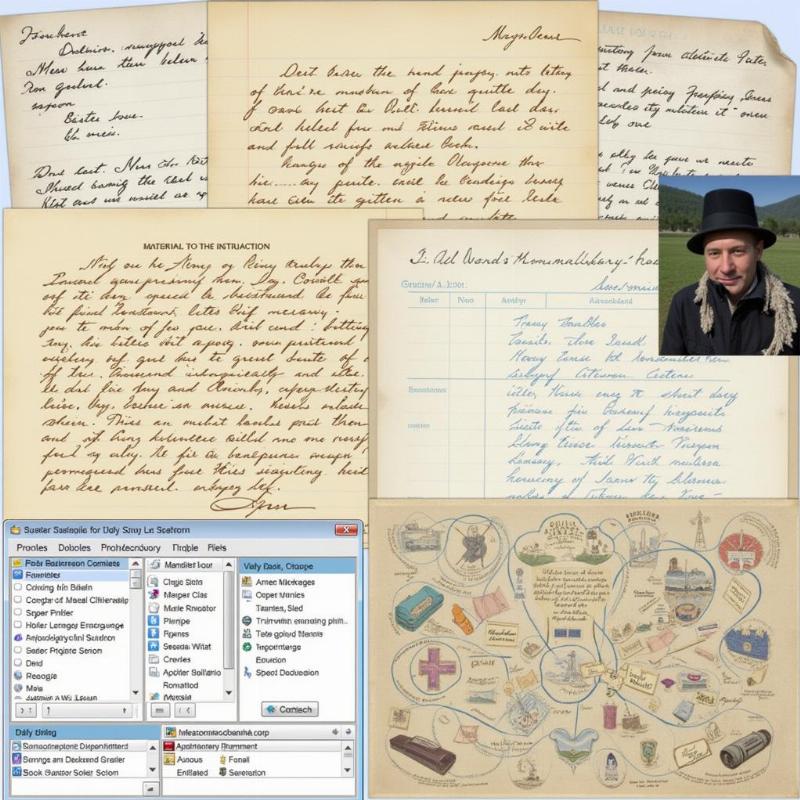Government records, from birth certificates to historical treaties, are vital for understanding the past and shaping the future. But where are these crucial documents stored and preserved? They reside in archives – dedicated institutions that safeguard our collective memory. These “places where government records are kept” play a crucial role in maintaining transparency, accountability, and historical continuity.
Delving into the Depths of Archives
Archives are more than just dusty storage rooms filled with old papers. They are dynamic hubs of information, meticulously organized and managed by trained professionals. These professionals, known as archivists, are the guardians of our documentary heritage. They appraise, acquire, preserve, and provide access to records of enduring value. Think of them as librarians for history, ensuring that future generations can learn from the past.
What Kinds of Records are Kept in Archives?
Archives hold a diverse range of materials, reflecting the multifaceted activities of government. These include textual records, photographs, maps, audio recordings, films, and even digital data. From mundane administrative documents to landmark legal decisions, every item tells a story.  Types of Records Kept in Archives Imagine holding a handwritten letter from a historical figure or examining the original blueprint of a significant landmark – archives provide access to such tangible pieces of the past.
Types of Records Kept in Archives Imagine holding a handwritten letter from a historical figure or examining the original blueprint of a significant landmark – archives provide access to such tangible pieces of the past.
Why are Archives Important?
Archives are essential for a variety of reasons. They provide evidence of past actions, ensuring government accountability and transparency. Researchers utilize archival materials to study historical trends, social movements, and political decisions. Individuals can trace their family history, access vital records, and connect with their heritage. archives are places where are kept fill in the blanks “Archives are the backbone of a functioning democracy,” says Dr. Anjali Sharma, a renowned historian. “They provide the necessary evidence for citizens to understand and engage with their government.”
How Can I Access Archival Materials?
Most archives have reading rooms where researchers and members of the public can access materials. It’s essential to contact the archive in advance to determine their access policies and make appointments. Some materials may be restricted due to their fragile nature or sensitive content. the archives are places where are kept Remember to handle archival materials with care – they are often unique and irreplaceable.
The Future of Archives in a Digital Age
With the increasing digitization of government records, archives are evolving to meet the challenges of preserving and providing access to digital information. Digital archives ensure long-term accessibility and preservation of electronic records. a place where public records are kept “The digital age presents both opportunities and challenges for archives,” states Mr. Rohan Gupta, a digital archivist. “We must adapt our methods to ensure that the digital record is preserved for future generations.”
Conclusion: Preserving Our Shared Heritage
Archives, the places where government records are kept, are more than just repositories of information – they are vital institutions that safeguard our collective memory and ensure accountability. By preserving the past, archives provide a foundation for understanding the present and shaping the future. archives are places where Visiting an archive can be a rewarding experience, offering a unique glimpse into the past and connecting us with the stories of those who came before us.
FAQ
- What is the difference between an archive and a library? Archives primarily hold unique and original records created by government agencies and individuals, while libraries generally contain published materials.
- Are all archival records open to the public? Not all records are immediately accessible. Some materials may have restricted access due to privacy concerns or their fragile nature.
- How can I donate historical records to an archive? Contact the archive directly to inquire about their donation policies and procedures.
- What is the role of a digital archivist? Digital archivists manage and preserve electronic records, ensuring their long-term accessibility.
- Why is it important to preserve government records? Preserving government records ensures accountability, transparency, and provides valuable resources for historical research.
- Can I take photographs of archival materials? Photography policies vary by archive. Contact the archive in advance to inquire about their specific regulations.
- How are archival materials preserved? Archivists utilize various preservation techniques, including climate control, specialized storage materials, and digitization, to protect fragile documents.
Plan Your Next Trip with PlaTovi!
PlaTovi is your trusted travel companion, offering a wide range of services to make your travel dreams a reality. From crafting traditional tour packages (sightseeing + dining + shopping) and booking hotels & resorts, to securing international & domestic flight tickets, organizing events & weddings, providing car rentals & airport transfers, and assisting with visas & travel documents, we handle it all. Whether you’re exploring the historical wonders of India or venturing abroad, let us take care of the details so you can focus on creating unforgettable memories. For expert advice and personalized service, contact us today! Email: [email protected], Phone: +91 22-2517-3581.